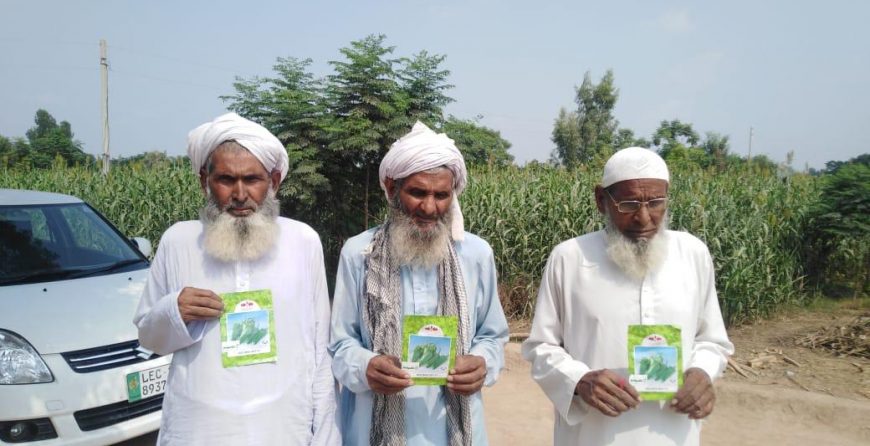A Small Pakistani Farmer Earns Millions
By Isra Shahid – Project Assistant at Haji Sons
A good seed ensures good yield, good income, and good health. To get that seed to the farmer in the first place, however, is not an easy task. Haji Sons Group, Pakistan is a pioneer in providing quality seeds to local farmers in Pakistan by partnering with overseas companies. One of these “life-changing seeds,” as called by the farmers is the hot pepper hybrid by the name of Golden Hot.
This seed is brought to Pakistan by the company in partnership with East-West International. Golden Hot distinguishes itself from the desi variety of hot pepper in Pakistan in terms of its quick ripening with exceptionally high yield as experienced by many farmers who have grown the crop in their farms. These benefits have enabled small vegetable-growing farmers to experience uplifted incomes not by a mere fraction – but by double and triple the number. Such is a story of Haji Muhammad Aslam and his two brothers.
When the brothers heard the buzz surrounding the new hybrid at a nearby village in 2011, they purchased the seeds to plant on one acre of their family farm and test whether it lived up to its claims against the desi variety they were already growing along with other vegetables (cucumbers, onions, lettuce, tomatoes, etc). The yield harvested was equivalent to a 2-3 acre field of desi variety. “It was unbelievingly worth a hundred thousand rupees,” says the youngest brother, Haji M. Aslam.
On the one hand, the quick ripening of the hybrid seed allowed the 47-member family to sell their produce to the market even before the start of harvesting for the desi variety. This enabled them to capture the market’s premium against the desi v ariety. What made it desirable to the market, on the other hand, was the similarity of the appearance of the hybrid seed to the desi variety. Consequently, there was no risk attached to the shelving of the “same pepper” that came in abundance at the start of the chili season.
Mr. Haji M. Aslam along with his family has successfully sown and harvested the high-yielding variety since 2012 each year and has increased its plantation from 2-4 acres to 25 acres to finally 45 acres out of the total area of 137 acres. With resultant, increasing incomes, the three brothers have been able to successfully perform Hajj three times in a row – in 2017, 2018, and 2019. A small family farm with little income once was able to earn a whopping 39 million last year from a 45-acre plantation only from growing Golden Hot.
“Our lives have changed for the better thanks to Allah and Haji Sons for bringing this seed to our country. May God bless these people,” says Mr. Aslam. With the dilemma that small farmers face in Pakistan in terms of government’s policies often ending up favoring the big landowners with resources, opting to make small investments seem implausible at their end. However, with such high-yielding results of a one-of-a-kind hybrid such as Golden Hot, it becomes reasonable for small farmers to make a fruitful, one-time investment such as this one.
The future of small farmers depends on good inputs and seed is a major one – as seen by Haji M. Aslam’s story – that needs to be addressed by the seed producers in Pakistan. Haji Sons Group remains one of the first initiators of bringing high-quality hybrids to the Pakistani seed market. In the words of Managing Director, Haji Sons and President, Asian Pacific Seed Association (APSA), “We are proud to have farmers like Mr. Aslam benefitting from quality seed that is one of the few, important ways needed to make the agriculture industry prosper. It’s stories like these that drive Haji Sons to put in the hard work to uplift small farmers of Pakistan.”
The company invests heavily in Research and Development to keep abreast of the changing needs of the farmers and consumers, striving to raise campaigns to generate awareness of recent trends amongst the farmers, especially. With Pakistani agriculture employing more than one-third of the workforce, it is vital to come up with improved seed varieties that take into account the needs of its producers, consumers, and the environmental ecosystem as we stand today at the center of climate change.



 Head Office:
Head Office:  +92 42 36619881-2
+92 42 36619881-2
 +92 302 8665445-7
+92 302 8665445-7

 Mon-Sat - 9 AM until 5 PM
Mon-Sat - 9 AM until 5 PM
